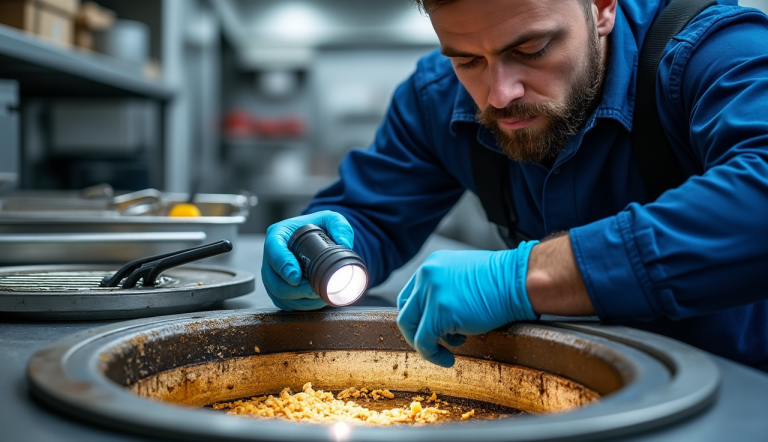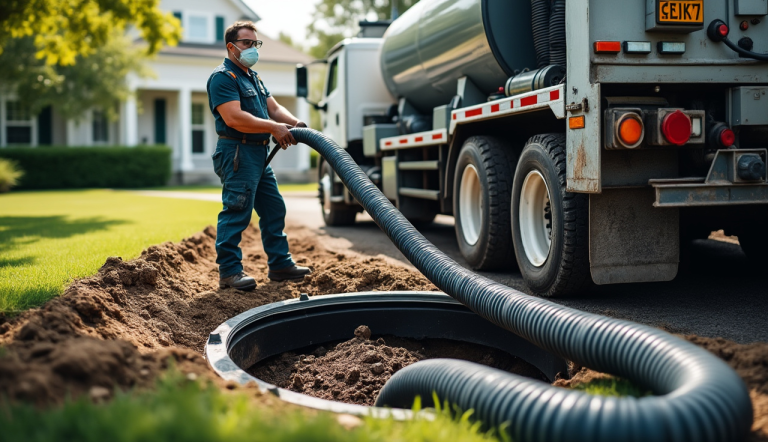The Crucial Importance of Regular Septic System Inspections for Homeowners
Why Regular Septic System Inspections Matter
Keeping your septic system in good shape is very important. Regular septic system inspections help avoid problems. They can save you money and keep your home safe. An inspection checks for any issues that could lead to bigger troubles later. If you are a homeowner in Middletown, New York, understanding the importance of regular septic system inspections will help you maintain one of the most important parts of your home.
Key Takeaways
- Regular inspections can prevent costly repairs.
- Inspections protect the health of your family and the environment.
- A well-maintained septic system lasts longer and works better.
- You can avoid backups and other issues with proper care.
For more information on maintaining your septic system effectively, you can visit our reliable septic tank filter inspection service.
What Happens During a Septic System Inspection?
When a professional inspects your septic system, they check many parts of it. Here are the main steps they follow:
1. Initial Assessment
The inspector will start by looking over the area around your septic system. They check for signs of trouble, like wet spots or bad smells. These can mean that something is wrong.
2. Signs of Backup
Next, they will look for signs of a backup in your home. This could be slow drains or water backing up in your sinks or toilets. These signs tell the inspector that the septic system may need help.
3. Measuring Scum and Sludge Layers
The inspector will also check the inside of the tank. They measure the layers of scum and sludge. This helps them see how full the tank is and if it needs pumping.
4. Tank and Component Inspection
The inspection includes looking at the tank itself and other parts. They will check the baffles, filters, and any pipes connected to the system. If any part is damaged, it could lead to more problems.
5. Flow Testing
If the system has pumps, the inspector may do flow testing. This checks if the pumps work well. A pump that does not work right can cause the tank to fill up too fast.
6. Final Reporting
After checking everything, you will get a report. This report tells you what the inspector found and if there are any issues that need fixing.
How Often Should You Get an Inspection?
Most experts suggest you get a septic system inspection every 1 to 3 years. However, if you have a larger household or use more water, you might need inspections more often. Regular checks help catch issues before they become big problems.
Benefits of Regular Inspections
Getting your system checked often has many benefits.
Prevents Costly Repairs
When you find problems early, it can save you a lot of money later. Fixing a small issue today is better than facing a big repair tomorrow.
Protects Health and Environment
A failing septic system can leak waste into the ground. This can harm your health and the environment. Inspections help ensure your system works well and protects both.
Extends System Lifespan
Just like your car or any other equipment, regular care helps your septic system last longer. With a good maintenance plan, you can extend the life of your system.
Ensures Legal Compliance
In Middletown, New York, homeowners must follow certain rules about septic systems. Regular inspections help you stay compliant with these laws.
Table of Common Septic System Issues
| Issue | Description | Potential Impact |
|---|---|---|
| Clogged Filters | Filters can become blocked with debris. | Slowed waste flow |
| Broken Baffles | Damaged baffles can allow solids to escape. | System overload and failure |
| Leaky Tanks | Tanks may develop leaks over time. | Environmental contamination |
| Roots in Pipes | Tree roots can invade septic lines. | Blockage and drainage issues |
Consequences of a Full Septic Tank
If you don’t get your septic tank pumped and inspected regularly, you could face serious issues.
Backups and Overflows
A full tank can overflow. This can lead to backups in your home. It can also cause a mess outside.
Damage to the System
A neglected system can suffer damage. This can mean costly repairs. You might need to replace parts of the system or the entire tank.
Environmental Contamination
When a septic tank leaks, it can contaminate water and soil. This can harm local wildlife and water sources. Keeping your system in good shape helps prevent this.
Bad Odors
A failing septic system can produce bad smells. No one wants that in their home or yard. Regular inspections can help avoid these issues.
Increased Maintenance Costs
The longer you wait to fix a problem, the more it will cost. Regular inspections keep costs down.
What to Do If You Suspect Issues
If you notice any signs of trouble, don’t wait. Call a professional to inspect your system. Some signs include:
- Slow drains or toilets
- Bad smells around the yard
- Wet spots in the yard
- Gurgling sounds from pipes
Each of these signs can mean your septic system needs help.
Common Problems Found During Inspections
Here are some common issues that inspectors find during regular checks.
Clogged Filters
Filters can get clogged over time. This can slow down the flow of waste. A simple cleaning can fix this problem.
Broken Baffles
Baffles keep solids from flowing out of the tank. If they break, it can cause issues. Replacing them helps keep the system running well.
Leaky Tanks
A leaky tank can cause waste to leak into the ground. This can be a big problem. Fixing leaks quickly is important.
Roots in Pipes
Tree roots can grow into septic pipes. This can block the flow. If the inspector finds roots, they may need to be removed.
Additional Maintenance Tips
To ensure your septic system runs smoothly, consider the following practices:
– Limit water usage during peak times.
– Avoid flushing non-biodegradable items.
– Schedule regular pumping and inspections.
– Monitor your drain field for signs of trouble.
How to Prepare for Your Inspection
Getting ready for your septic inspection can make things easier. Here are some steps you can take.
Clear the Area
Make sure the area around your septic tank is clear. Move away any plants, debris, or furniture. This helps the inspector do their job.
Know Your System
Be aware of where your septic system is located. This includes the tank, drain field, and any other parts. Knowing this can help the inspector work faster.
Keep Records
Have any previous inspection reports ready. This information can help the inspector see what has been done and if there are ongoing issues.
Ensuring Long-Term Care
Regular inspections are essential for maintaining your system. For expert assistance, you can check out our service for thorough septic tank filter inspections to ensure your system operates efficiently.
What Happens After the Inspection?
Once the inspection is done, you will get a report. This report will list any findings and recommendations. If there are issues, you can schedule repairs.
Follow Up on Recommendations
If the inspector suggests repairs, don’t wait. Set up a time to get the work done. This will help avoid bigger problems later.
Keep Up with Regular Maintenance
After the inspection, keep up with regular maintenance. This includes pumping the tank and checking for any signs of trouble.
When to Schedule Your Next Inspection
Plan your next inspection based on the inspector’s recommendations. If you have a larger household or experience heavy water usage, you may need inspections more often.
Conclusion
Regular septic system inspections are key to keeping your home safe and your system working well. They help prevent costly repairs and protect your family’s health. In Middletown, New York, following local laws and guidelines is also very important.
By being proactive and scheduling inspections, you ensure your septic system remains in good shape for years to come. Remember, a little care now can save you a lot of trouble later. Don’t wait until problems arise. Call a professional today to set up your inspection.
Contact Us
If you are ready to schedule your septic inspection, call United Sewer & Septic at (888) 845-2564 or (845) 637-3544. Our team is here to help you keep your septic system in great shape. Whether you need an inspection or repairs, we have the experience you need. We serve Middletown and the surrounding areas in Orange County, New York. Your peace of mind is just a phone call away!


